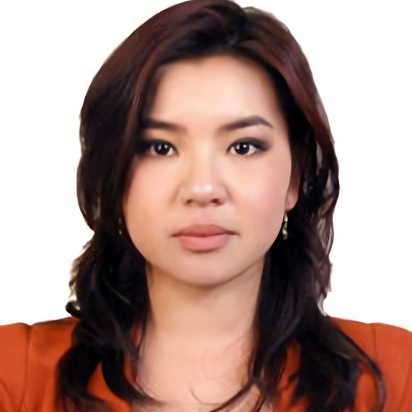Voices from the Sylff Community
May 20, 2024
Raising Awareness: Addressing the Impact of Childhood Trauma and Promoting Trauma-Informed Care
In February 2024, a conference was organized by Dorjkhand Sharavjamts (National Academy of Governance, 2020) using an SLI grant to address the pervasive issue of childhood trauma in Mongolia. Held in Ulaanbaatar, the meeting brought together experts in children’s care, child protection advocates, parents, and policymakers to elevate awareness, share insights, and strategize on improving mental health outcomes for children.
* * *
Since I was very young, I have always been tuned in to the problems kids face, including the issues I went through myself. I was particularly struck by how parents and their kids talk to each other. This was troubling for me, given the high prevalence of divorce and alcoholism in Mongolia and the observation that many adults seemed ill-prepared for the responsibilities of parenthood. These issues appeared to be systemic, contributing to a cycle of dissatisfaction and underdevelopment permeating Mongolian society at every level.
Even though I focused my energies on my studies, I never stopped thinking about how families can hurt or help each other. I have always wanted to shine a light on these issues and get people talking about the family traditions that are worthy of passing on to future generations and those that need to be discouraged. The chance to research these issues and disseminate my findings presented a unique opportunity to address these concerns head-on.
When I was attending the National Academy of Governance in Mongolia, I learned how I could make a difference in the world when I met Mr. Ryoichi Sasakawa during his visit to Mongolia in July 2023. His speech exuded kindness and emphasized the importance of contributing to society. His suggestions to us gave me the push I needed. Inspired by him, I decided to organize a conference, hoping it would get people talking about protecting kids, stopping harmful behavior, and helping children who have been through tough times.
Receiving the SLI award was a significant milestone, as it marked the transition from intention to action. The award prompted me to focus on making the biggest impact I could. And I did not want the project to just be a one-off event. That is why I worked to establish an NGO called the Public Mental Health Promotion Center in October 2023—just after I received the award. The aim of this NGO is to continually engage the public in critical conversations and provide support to those in need, particularly in understanding and addressing psychological issues.
A Microcosm of Collective Resolve
On February 24, 2024, we held an event called “Breaking the Chains: Understanding Childhood Trauma” in Ulaanbaatar. Our conference was organized into three segments, each including a lecture, a workshop, and a panel discussion, to cover the multifaceted issues of childhood trauma. We hosted three expert lectures that delved into the effects, recognition, and healing of childhood trauma, alongside the significance of trauma-informed care in child protection and mental health.
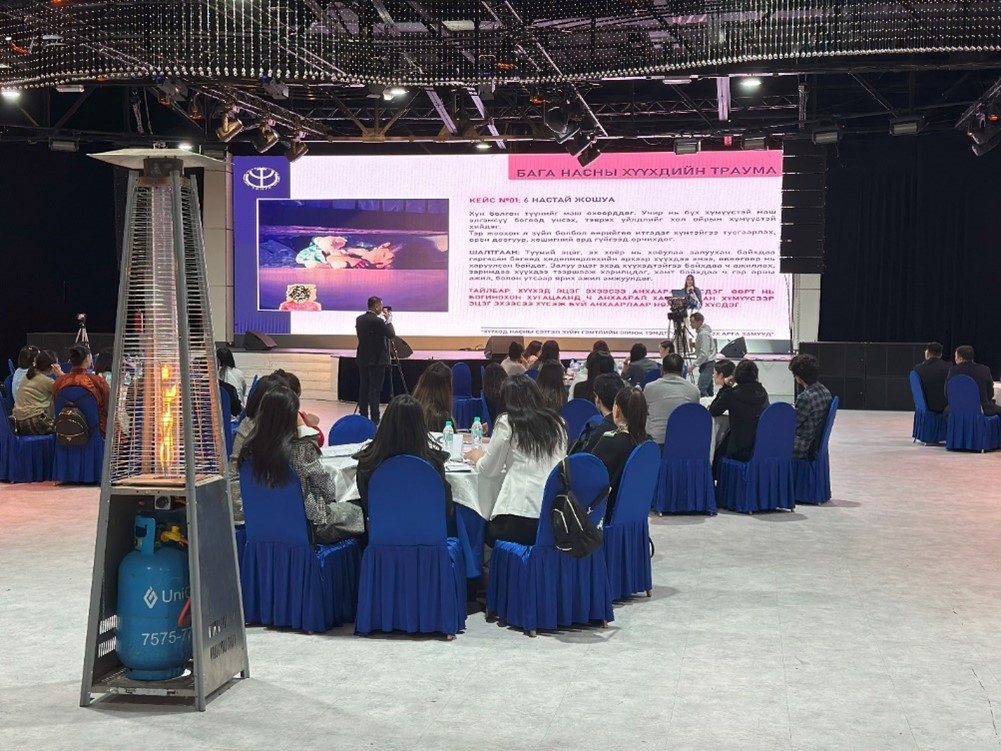
The February 2024 event attracted over 100 participants from a cross section of Mongolian society.
The conference revealed the many difficulties kids in Mongolia must deal with because of old beliefs, financial hardships, a shortage of schools and hospitals, and most importantly a lack of knowledge among parents and childcare professionals about how best to work with children. Our ambition was to forge a space where professionals, advocates, parents, and policymakers could converge, share insights, and collaboratively chart a course forward to improve the mental health outcomes of children who have been impacted by trauma. Drawing over 100 participants from a cross section of Mongolian society, including government officials, NGO representatives, educators, legal professionals, and parents, the conference represented a microcosm of communal concern and collective resolve.
The event was structured to foster a comprehensive exploration of childhood trauma, from its origins and impacts to strategies for recovery and resilience. Starting with compelling opening remarks from Professor Khishigjargal Bazarvaani of the National University of Mongolia and extending through a series of expert-led presentations and workshops, the conference facilitated a deep dive into the multifaceted nature of trauma. Participants were not merely passive recipients of information but engaged contributors, sharing personal narratives, professional insights, and practical strategies for addressing trauma.
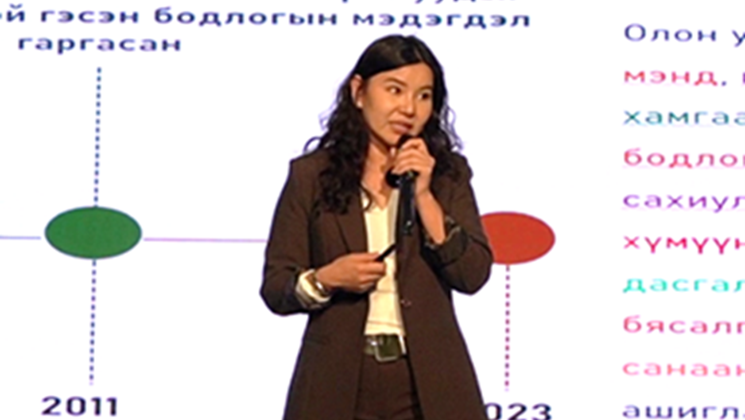
The author was one of the keynote lecturers at the conference, who, along with Professor Khishigjargal Bazarvaani and practicing psychologist Adyiasuren Enkhbaatar, provided a strong scientific foundation for understanding childhood trauma.
Compilation of Actionable Recommendations
From the perspective of promoting effectiveness, participants were divided into 10 subgroups from the beginning. Perhaps most impactful were the smaller, breakout discussions and workshops, where the lines between personal experience and professional expertise became blurred. Each participant brought their unique perspective, enriching the discussions that deepened everyone’s understanding of the issues and reinforced our determination to enact positive change.
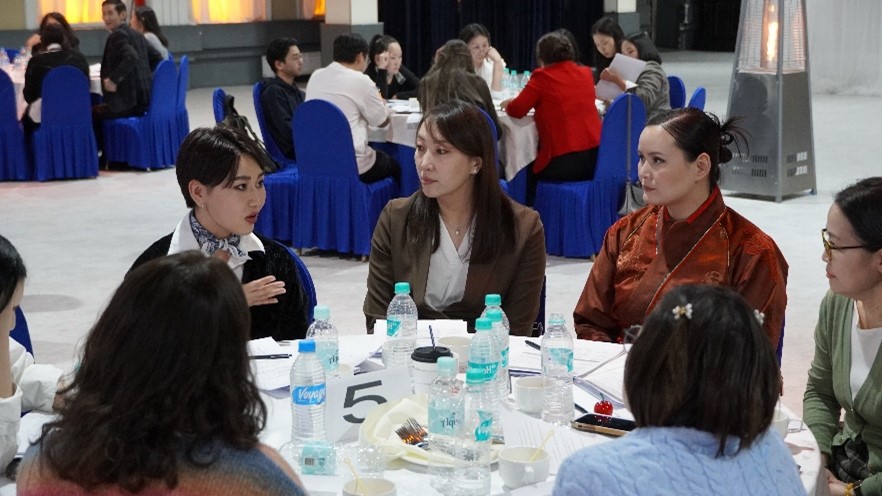
Discussions in each group were moderated by psychology experts, giving each participant a chance to freely share their experiences and express their opinions.
One concrete outcome of the conference was the compilation of actionable recommendations. This collaborative endeavor resulted in a robust framework for action spanning many different areas, from individual behaviors to systemic reforms—all aimed at fostering a supportive environment conducive to the healing and thriving of children. These recommendations reflected the collective insights and understanding of the conference participants, embodying a shared commitment to making a tangible difference in the lives of children affected by trauma.
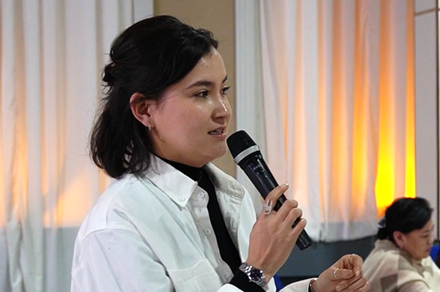
Participants introduced recommendations and plans for further action generated by each subgroup. (Photo1)
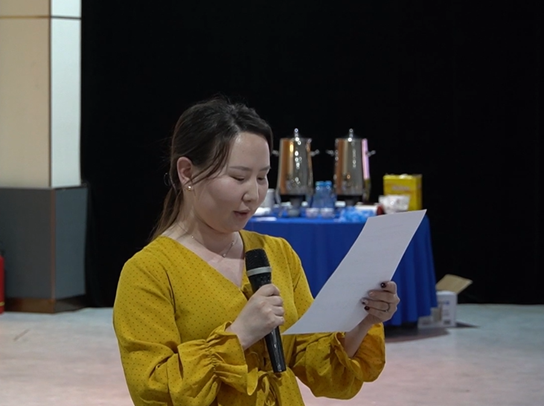
Participants introduced recommendations and plans for further action generated by each subgroup. (Photo2)
The overwhelmingly positive feedback received post-conference underscored the event’s profound impact on attendees. Many participants reported gaining deeper insights into childhood trauma and leaving with a renewed sense of purpose and commitment to integrate what they learned into their personal and professional lives. Such enthusiastic responses were a testament to the conference’s success in reaching a diverse audience, stirring hope for better days ahead.
Reflecting on the “Breaking the Chains” conference fills me with a deep sense of gratitude and optimism. I am thankful for Sylff’s support, the wisdom shared by our speakers, the dedication of our participants, and the collective belief in the possibility of change. This event, though a single point in time, represents a significant step forward in an ongoing journey to build understanding, healing, and resilience. I am grateful for the support from everyone who joined our effort. This conference was just the start, and it showed how talking and working together can lead to big changes. We have a long way to go, but I believe we can make life better for kids in Mongolia by working together to break the chains of trauma, one link at a time.
